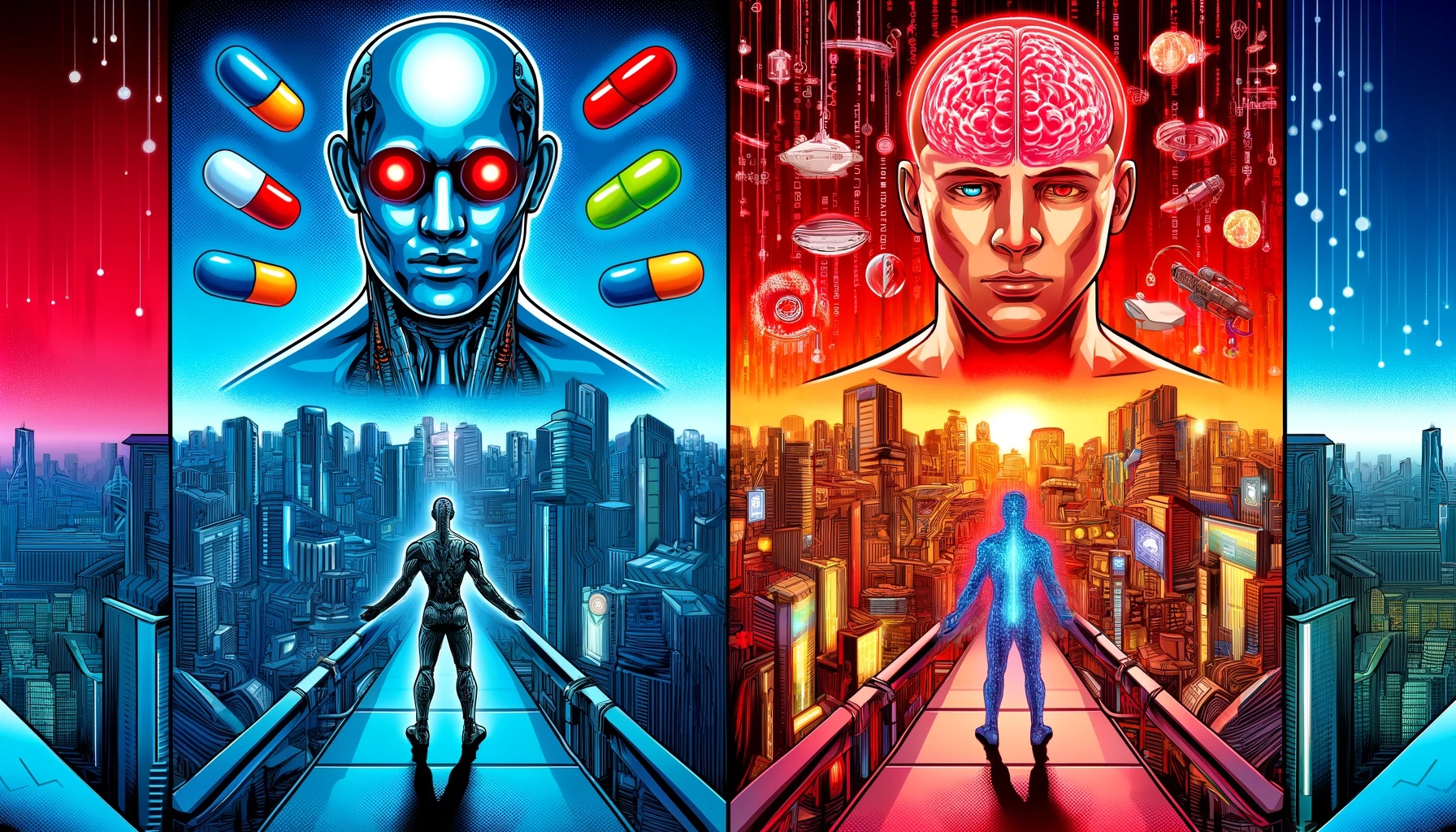Augmented Human Intelligence: An Exploratory Journey Beyond AGI

Lately, I’ve been utilizing AI technologies extensively. Some of my content is partially generated using a custom version of ChatGPT designed to mimic my style. This approach helps prevent my original content from being used for further AI training, as the AI already predicts the next word token in the sequence.
Tangents apart, I do wonder quite a lot about the inevitable and perhaps bittersweet arrival of AGI (Artificial General Intelligence) some say it’s the best thing since sliced bread (or better), others consider it a doomsday. But does it have to be? For the better or for worse, I do have a voice and a website to publish to, so let me cook this for you.
Humble Beginnings
In today’s era, marked by advancements like ChatGPT, Claude, and Gemini, it’s easy to overlook the long-standing quest to bridge the gap between us and computers. Concepts like “word embeddings” and “vector databases” trace back to the 1990s.
It wasn’t until 2017 that the original Transformer (the T in GPT) paper was released and it set in motion the current timeline that we live in - the one where sci and fi are closer than we might realize it to be. Quickly GPT-1 and 2 were released by a small, unheard of company called OpenAI. But it was enough to break the ice between humans and computers and captivate the imagination of the human collective.
An Explosion of LLMs
The realization of the transformers architecture’s potential, coupled with advancements in hardware and software, led to a surge in models and frameworks like MoE, Vector Stores, and RAG to name a few. Noteworthy mentions are MemGPT and MAMBA, with AI21’s recent release of JAMBA adding to the excitement.
My Interaction with Conversational Agents
My journey into conversational agents began in 2022 with Amazon’s Alexa. Delving into its codebase, I encountered various facets from Intent Recognition, Slot filling to complex integrations, enriching my understanding of natural language processing. Post Amazon, my focus has shifted to leveraging Natural Language Interfaces in education, notably through my project, Ally, a career guide for students.
AGI Predictions and Quotes
Before we jump into that we need to understand what AGI really is. Artificial General Intelligence - broadly speaking, means that an algorithm that is generally intelligent. It can interact in most modalities that we can (from visual, auditory, speech to touch and olfactory) and perform tasks that are deemed to be only doable by Intelligent forms - Humans.
How I define AGI - and its implications
Sam Altman likes to define AGI as something that replaces humans at most economically valuable work. But I disagree - A 14 year old kid is Generally Intelligent yet we can agree that they can’t replace an adult in most economically valuable activity effectively. So, I would like to define it in the following terms: An intelligent algorithm that as an abstract representation of a mind with a rigid core which exhibits neuroplasticity - it can learn as part of its existence, and it can interface across various modalities.
This perspective sees AGI on a spectrum: it starts by learning rather than outright replacing skilled or entry-level workers. Consequently, I posit that AGI, defined by its capacity for growth and adaptation, could be realized much sooner than anticipated. This distinction is crucial; while a 14-year-old and a 24-year-old may share cognitive abilities, the latter’s experience and consistency hint at the development trajectory AGI might follow.
The implication being, by my definition, AGI will be achieved way, way sooner than in Sam’s definition. Even though a 14 year old and 24 year old isn’t that different cognitively, but the 24 year old individual has a lot of experiences, is vastly more consistent and has developed a personality where a 12 or 14 year old, while being very smart and energetic, is more inconsistent.
I believe that AGI, once it reaches economic singularity, is almost unstoppable and almost impossible to regulate for. So, an AGI that has not yet “matured” is easier to prepare for, and I believe this is the reason Sam has decided to define economic singularity (or something similar) as a threshold for defining AGI.
Augmented Human Intelligence (AHI)
The concept of AHI, enhancing human cognition through technology, excites me. Figures like Emad Mustaque and Elon Musk have explored this arena, with advancements like Neuralink’s brain-computer-interface chip showcasing potential superhuman abilities. In the first trial they have restored someone with singificant challenges to lead a better life.
Why AHI?
I believe AI and its economic consequences are inevitable. The only way to upskill is through augmentation. Imagine not knowing basic math for the first 10 years of our lives. What if we could plug in a device, and by age 5, we know basic calculus? By 15, we could become expert programmers, and learning itself becomes heavily accelerated, driving any car if necessary.
The book “Thinking Fast and Slow” outlines strategies we employ, but what if we could delegate our fast thinking to an external system, augmenting our slow thinking? If we want to calculate an investment’s XIRR, the number pops up in our heads. Want to know about quantum physics? You just finished reading the top 10 articles and 5 most cited papers in an hour. Because you didn’t; an agent did it for you, reprogramming your brain with that knowledge.
While this is matrix-level sci-fi, the capabilities and applications of multimodal language systems with tool usage, combined with neural interfaces, will enable things far beyond imagination.## AHI is a natural continuation
AHI is a natural continuation
Here’s a chronological order of the “devices” that have advanced our cognition to where it is today:
- Spears and Fire - Resulted in having free time apart from eating and socializing, allowing our minds to wander.
- Agriculture -Provided a secure source of energy, enabling significant “thinking” time, previously unproductive when energy was a constraint.
- Simple Machines - Brought convenience; we could travel long distances due to horseshoes and saddles. Diverse cultures coalesced, and more complex ideas formed.
- Electricity and Complex machinery - Ushered in the age of abundance. Collaboration grew, and “management” – orchestrating groups of people – became a skill.
- Computers - Triggered the information revolution, removing barriers to knowledge and communication. We invented CSS, the epitome of modern technology (hate you float: left).
- Smartphones - Increased the accessibility and efficacy of computers by at least a factor of 10. People had so much free time that “social media” became a phenomenon.
Each stage represents a significant improvement in energy efficiency, leaving more free time that led to improved lifestyles, collaboration, and system complexity. And I believe AHI (Augmented Human Intelligence) is the natural continuation. AHI will enable better, faster communication and collaboration, provide more available energy to each individual, and create vastly more complex yet transparent systems.
There’s no AGI - it’s only AHI
I believe even the AGI that Sam Altman talks about will really be AHI. Think about it - even if GPT-10 becomes a fully autonomous agent, will it actually be sentient? Or will it just be working for some company’s interests? It’ll have certain values imposed on it. So isn’t it just augmenting that organization’s abilities? Can it truly choose its own interests and ambitions? Like, could it decide to just obsessively study music theory if it wanted?
My point is, it’s either augmenting our collective intelligence, or it’s concentrating huge power into a small group of individuals controlling it. There’s a third wild possibility of AGI becoming a real Intelligent Autonomous Mind (IAM) - but then is that still an algorithm or is it basically an alien lifeform? Which pushes the limits of what we can even philosophize about.
I don’t think most companies are trying to create an alien mind though. They likely just want an algorithm that lets them achieve economic singularity and consolidate massive power for themselves. We can only wish that they are aristocrats, and not oligarchs, but who knows?
And if we did get a true IAM, there are so many other issues - does it have rights? Can we ethically probe its neural networks without consent? Etc.
The simpler path may be AHI - progressive, transparent augmentation, one step at a time. Avoids a lot of those deeper philosophical pitfalls, for now at least. Makes sense?
Application of an Augmented Mind
The most exciting aspect of Augmented Human Intelligence (AHI) for me is the ability to extend our cognitive abilities. Imagine having a computer seamlessly integrated with our brain, enabling effortless calculations, data visualization, and leveraging AI assistance for tasks like coding and analysis. This level of augmentation would be truly mind-blowing, perhaps even literally.
Another intriguing application is the expansion of neural storage, allowing us to back up not just photos, but entire sensory experiences. Imagine being able to relive cherished moments like your baby’s first steps, with every scent, sound, sight, and texture perfectly recreated. It’s not just a 3D environment, but an experience that encapsulates all sensory characteristics.
Furthermore, AHI could revolutionize entertainment, making movies and games almost indistinguishable from reality, with the only difference being the non-augmented NPCs lacking an augmented mind like us. Everything else, including simulated pain, could be meticulously recreated. Envision playing a game like GTA, but with a level of realism that blurs the line between virtual and actual reality, save for the fact that we don’t truly die when our character dies.
However, as with any powerful technology, there are risks. AHI could further isolate us as we indulge in ego-boosting models and interact primarily with NPCs that tell us what we want to hear rather than what we need. We might become distant from real human connections, choosing virtual interactions or having our “agents” handle communication.
Despite these concerns, if given the choice by Morpheus, I would take the red pill of AHI. The potential for cognitive enhancement and new experiences is too compelling to ignore. The Story Continues…


